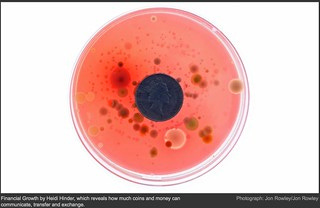Cash and coronavirus, gross and Grossman
China has been quarantining people to prevent the spread of the dreaded coronavirus (as has the UK and everywhere else) but now it has started to quarantine money as well. The government has stopped the transfer of old bank notes between cities most affected by the virus and has started to sanitise old money to reduce the risk of infection and well as producing heading toward $100 billion of new cash. Cash from hospitals and food markets is being segregated. The banknotes will be bombarded with ultraviolet rays or heated and then put under lock and key for a fortnight (only a week in less risky areas apparently) before it is let loose again.
This may seem an overreaction, but it isn’t. Money is filthy and I find stories about how filthy cash is both interesting and amusing. According to the Wall Street Journal, NYU researchers analysed the genetic material on $1 bills and found 3,000 types of bacteria in all (the most abundant species they found is one that causes acne). More scarily, some of the bacteria carried genes responsible for antibiotic resistance. I am not accusing Americans of having particularly revolting money, by the way. Back in the UK, ours is just as bad.
As the Daily Mail noted, there are more germs on a £1 coin than a toilet seat, but only one in five people wash their hands after handling them (coins, I assume they mean, not toilet seats). That money is filthy is not news to me because a generation ago when the first wave of electronic cash was in pilot, there were some groups of retailers who rather liked the idea of shifting away from cash to electronic money for reasons that were nothing to do with economy or efficiency. I remember talking to a hairdresser in Swindon during the Mondex pilot, and she told me that she liked the idea of doing away with cash because cash was filthy and she had to keep washing her hands all day because of touching it. Somebody in a bakery mentioned the same to a colleague of mine. Lucre really is filthy.
I talked about this years later in one of my first ever blog posts, called “End the cash menace now!“. From time to time over the years, I’ve brought this up as one of my general and persistent complaints about cash. And it isn’t just the cash that is filthy. ATMs in the UK are also reservoirs of pestilence. And sadly, so are plastic cards (in fact, in a spirit of scientific enquiry, I should report that one study in London found a higher percentage of contaminated cards!). It seems as if a lot of things, in the UK at least, are absolutely filthy.
Unfortunately, I don’t think the dirty money meme plays into my pro-electronic money hands as much I’d like. After all, it is mobile phones that are going to get rid of cash and here the news is not good. The average mobile phone is even dirtier than the bank notes! It’s not hard to see why because in the UK faecal bacteria are present on 26% of hands, 14% of banknotes and 10% of credit cards. That article goes on to say that one in six mobile phones are dirtier than toilet seats, although I’m not sure whether they are dirtier than £1 coins although as my colleague Neil McEvoy points out, you don’t generally pay for things using other people’s mobile phones.
My final piece of evidence that we are unlikely to be able to use the filthy, germ ridden, infectious nature of money as a propaganda tool in the war on cash came from the Tomorrow’s Transactions Forum back in 2012 when one of the speakers, or one of the panellists (I can’t remember which), made a remark about the propensity of money to pass on communicable diseases. One of my favourite journalists, Wendy Grossman, was there at the time and she immediately countered the speaker by making an unequivocal offer to lick any money that Forum delegates might wish to present. Throwing herself on the barbed wire for science, so to speak, earned her a place in Forum folklore. As Wendy wrote, calling it "Microsoft-level FUD, and not worthy of smart people claiming to want to benefit the poor and eliminate crime", she licked a fiver and a Danish banknote. Last time I saw her she appeared fit as a fiddle, but perhaps the delegates that day had exceptionally clean money.
By the way, if you are curious about the relationship between cash and filth, check out these amazing pictures from Heidi Hinder, an artist who also spoke at the Tomorrow’s Transactions Forum, showing the bacteria from coins growing in culture.

Courtesy: Heidi Hinder. Photo: Jon Rowley.
When it comes down to it, money is filthy, but so are we. I’m afraid, much as I hate the horrible stuff, germs aren’t the nail in cash’s coffin that I’d hope, but I wish China all best in locking it away in the interests of public health.

By the way, I remember a report from MasterCard that reported that on average European banknotes and coins contain 26,000 bacteria while good old Sterling has a mere 18,200 bacteria. So Brexit Britain's money is cleaner than European money!




